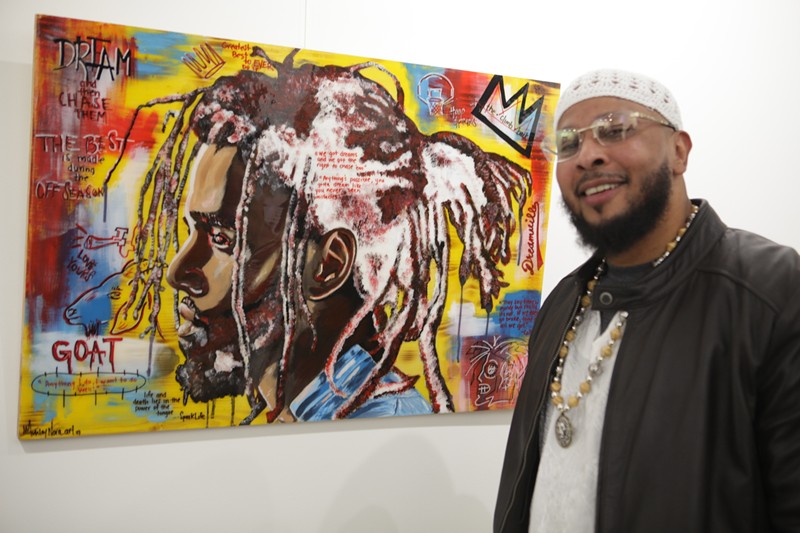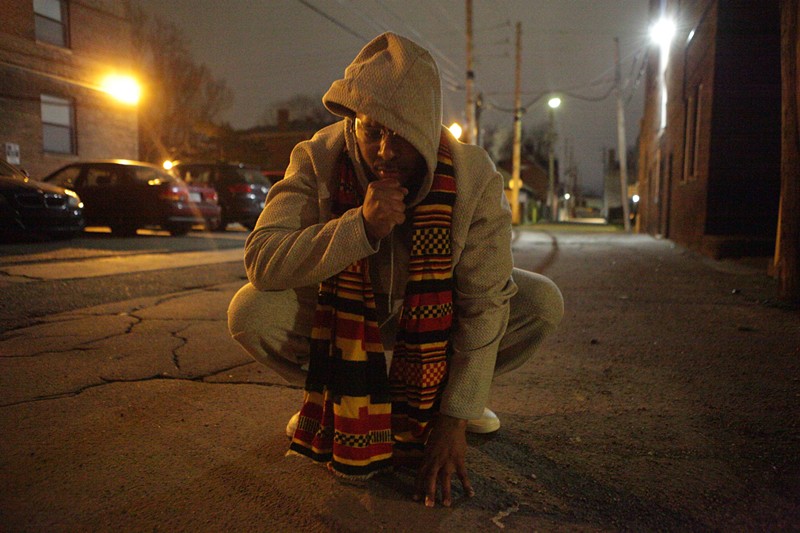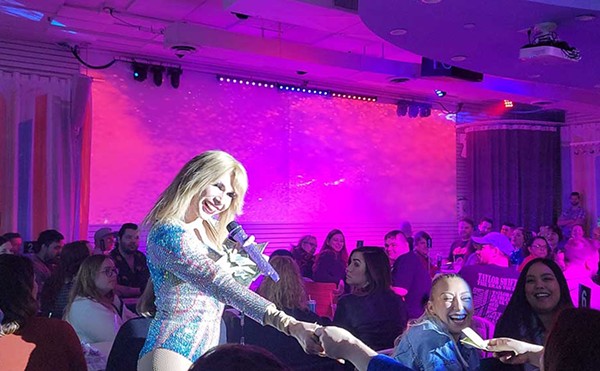The kitchen in Leon Benson’s sister’s house smells of lemon and essential oils. It’s tidy, open, and calm, a stark contrast with the prison cell where Benson spent the past 25 years confined.
“Aromatherapy,” he says gesturing to a diffuser on the counter with a gentle smile. “The smell of lemon is good for the brain. [It’s] one of the things I read about when I was locked up.”
Benson is wearing all white like some sort of spiritual leader. On his T-shirt is a picture of Harriet Tubman and the quote, “I freed a thousand slaves. I could have freed a thousand more if only they knew they were slaves.” While historians doubt Tubman ever truly said this, it’s a fitting quote for a man who found the power to free himself of both physical and mental slavery behind bars.
In 1999, Benson was wrongfully convicted of the murder of a young man named Kasey Schoen in Indianapolis, where he was living at the time. He was exonerated in March of 2023 after serving 25 years of a 61-year sentence at the Correctional Industrial Facility in Pendleton. He spent ten of those years in solitary confinement.
Three months after his release, the Detroit-based rapper is back home with his family (he’s originally from Flint) and has dropped his debut EP, aptly titled Innocent Born Guilty, on Die Jim Crow records. The non-profit label works with currently and formerly incarcerated artists.
For his music, Benson goes by the moniker El Bently 448. In his younger days, he used the stage name Evil Lee, but it no longer matches his positive life outlook.
“Today is day 97, after 25 years,” Benson says as he sits down on a tufted sofa with diamond stitching that intersects at the point of innocence and perceived guilt.
Benson was 22 at the time of his arrest and is now in his late forties. He’s maintained his innocence the entire time, noting that while he was dealing drugs back then, he never killed anyone. His case was dismissed following an investigation by the University of San Francisco School of Law’s Racial Justice Clinic and the Marion County Prosecutor’s Office Conviction Integrity Unit. His case was the first successful exoneration for the Conviction Integrity Unit, which was created in 2021.
There was never any DNA or other evidence linking Benson to the crime. The investigation found that police suppressed evidence pointing to another man, Joseph Webster, as the killer.
Benson’s case is the subject of the third season of true-crime podcast Suspect, titled “Five Shots in the Dark.” The murder victim, Schoen, had been shot five times.
“I admit, I done shot at people. I done kicked people [sic] ass with bats, with bottles, jumped people. Come on, I’m from the streets,” Benson says. “I never killed nobody though. I’m so happy I never killed nobody. I’m not a murderer. It’s not right.” He shakes his head.
Over the next couple of hours, Benson tells us how he got wrapped up in selling drugs, a vehicle that took him farther away from his dreams of being a rapper than he ever imagined. Yet, in prison, he found solace in Shakespeare, Carl Jung, and Hebrew Israelite teachings. He talks almost like a preacher giving a sermon, with his energy rising from peaceful to impassioned but never angry, as he frequently breaks out into philosophical and mythological stories.
In the early morning of August 8, 1998, when Schoen was shot and killed, Benson was gazing out of his window envisioning his future. He was in an apartment building about a block away from where the crime took place and had just made $20,000 in one night in drug deals.
He was thinking about expanding his drug operation so he could make enough money to release his first album.
“I was like, ‘Yeah, I know what I’m finna do,’” he recalls with stars in his eyes. “‘I’m finna put $50,000 into making this album. And I can get some singers off the streets. I can just pay them in dope.’ ... It was so toxic and I was just tripping. I didn’t even have a gun. I was on that time. I was a spiritual warrior even then and I was like, ‘I don’t need no gun, ain’t nothing coming to me.’ ... And when I counted that money and looked out my window, I was like, ‘Yeah, that’s what I’m gonna do. Imma sell bricks. I got Flint, I got Detroit, I got Indianapolis, I got plugs in Atlanta. Yeah.’”
But something was coming to him. When the police arrested Benson several days later, he thought he was getting busted for being a dealer, since he was already on probation for drug possession. When they mentioned murder, he knew they had nothing on him and figured it’d be over soon.
“You said a murder?” he exclaims with a laugh. “Yeah, right! I told them, ‘Look, I was in the [apartment] building sitting in the back stairs. This person and that person saw me.’ But I omitted that I was selling drugs and maybe because I did that [the detectives] thought there was something going on.”
Benson was tried twice, the first time ending in a mistrial and the second handing him a guilty verdict. But the lead detective in his case, Alan Jones, had withheld several pages of notes, tips, and multiple accounts from witnesses saying they saw Webster commit the murder. Since Jones didn’t give this information to prosecutors, Benson’s defense attorneys weren’t privy to it either.
A confidential informant reportedly told an Indianapolis drug detective that Webster had bragged about the killing. Another witness said they saw the murder happen and recognized the shooter from the neighborhood. The same witness picked Webster out of a photo array and reportedly told police that Webster had shown him a .380 handgun, the same type of weapon used in the shooting. Webster’s girlfriend had reported her .380 caliber handgun stolen around the time of the murder. Two anonymous Crime Stopper reports also identified Webster as the killer.
Talk around the neighborhood was that police were looking for “Looney,” which is how Webster was known on the streets.
Yet Benson — whose nickname in Indianapolis was “Detroit” — was convicted based largely on a statement from a white woman who witnessed a Black man shoot into the passenger window of Schoen’s truck as she was loading newspapers into a newsstand across the street. She told police she saw a dark-skinned Black man wearing a black shirt and black pants with three white stripes down the sides, a vague description that could have fit nearly anyone. She later picked Benson out of a photo lineup even though he’s light-skinned.
Another witness, Donald Brooks, also claimed to have seen Benson shoot Schoen, though he attempted to recant his statement in the first trial and feigned memory loss in the second.

Rather than being bitter, which few people could fault him for, Benson looks at his time in prison as a catalyst for growth. Nodding to Jung, Benson believes he’s the hero archetype, like Odysseus in The Odyssey, and prison was part of his hero’s journey.
“It goes all the way back to me moving to Detroit and wanting to be like Esham to becoming [El Bently 448],” he says quietly, almost like he’s singing a baby to sleep. “In life, you gotta go through your particular trials of fire. Much like precious metal that gotta go in the fire to get burned, we have to go through struggle to be more pure, and I became way stronger than I ever could believe.”
While he was locked up, Benson began studying and later teaching Shakespeare to other prisoners alongside a professor of literature from Indiana State University.
“My interest in it initially was, I know my man [Tupac] was rocking out with Shakespeare, so I thought, ‘What’s up with this Shakespeare thing?’” he says. “But I loved the adaptation of it. I would deconstruct the words and make them relevant to my world because I wanted to talk to my people in Flint and Detroit, people from urban [areas] and hip-hop. I seen the art therapy in that. So, Macbeth, I said nah, he wasn’t an English king that went rogue, he was a kingpin that knocked off one of his guys.”
Benson taught Shakespeare in the “SHU,” a prison term for specialized housing units that often involve disciplinary segregation, for seven years. His favorite play was Othello.
“Othello represented what we represent now: being a foreigner and tacit racism,” he says. “With a lot of artists or people of color in powerful leadership positions, you’ll see this Kanye thing come out where you’ve got to be a tortured artist, you’re going to crash and burn… And just like Othello ended up murdering Desdemona for what Iago set in place, this is what society does to us.”
In one of his tracks on the EP called “Innocence,” El Bently 448 raps, “The west side of Flint, where I’m from and where I scrimmaged in/ so it should be no surprise for what I started dealing in/ I’m making no excuses I’m just pointing out your ignorance.”
The song criticizes the detectives and jury in his trial who deemed him guilty based on his race and background, things that had nothing to do with the murder.
And yet, even before his time in prison, Benson knew that dealing wasn’t the life he was meant to lead. He originally moved to Indiana to help an uncle move and ended up working as a painter and refurbishing houses.
“In my heart of hearts, I just wanted an honest living doing what I do. I always wanted to be a rap artist,” he says. “Unfortunately, the people who I encountered that was my age [were] full-fledged drug dealers. But we was cool. We hit it off. These were the people that I knew and they showed me love.”
He continues, “When I was on the streets, they’d say, ‘Man why are you here? You always got a smile on your face man, and you just make us happy.’ I’d sit with the youth and I had them doing poetry in the corner. I was so much in the streets with it. It was kind of parasitical, though at the same time symbiotic.”
At his sister’s house, where he’s now staying, Benson thinks back on that night of the murder again. In hindsight, it seems as though the events that unfolded were divine intervention.
If he had continued on the path he was on, Benson says, he likely would have ended up dead.
“I got taken out of that situation. It was like, ‘Come on man,’” he says in that soothing voice, again gesturing like someone — god, spirit, or otherwise — pulled him off the streets, away from selling drugs. “And I went through all that stuff like solitary and everything. And you’re forced to ask the question, ‘Why?’ But now I got my purpose.”
He believes his purpose, besides making music, is to realize and teach others that we all have a choice.
“We live in an absurd universe,” he says, reciting existentialist philosophy. “And it’s only humans that give the universe its essential meaning. The authentic life is the life that recognizes and embraces that they have unlimited freedom of choice. And the life that lives in dread realizes or feels that they don’t have choice or allows other people to paint the choices of circumstances. So that really weighed on me.”
When we catch up with him via email a week and a half after our interview, Benson has just returned from a healing retreat. As a free man with all the choice in the world, he chooses to prioritize his mental and spiritual health.
“The healing retreat was really groundbreaking for me and my sister Valerie,” he writes. “I’m looking forward to going to another one in September. Wellness is my number one priority.”
He signs the email, “For A Better World, EL BE.”
Innocent Born Guilty is out now on Die Jim Crow Records and is available on most streaming platforms.
Subscribe to Metro Times newsletters.
Follow us: Google News | NewsBreak | Reddit | Instagram | Facebook | Twitter







